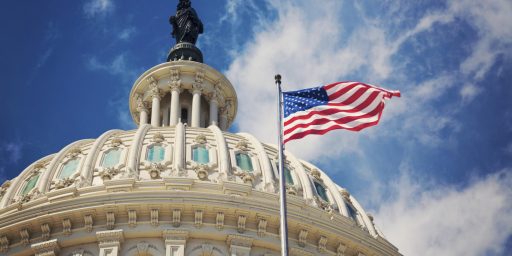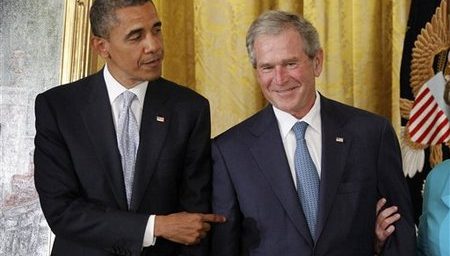A Quote to Ponder
On presidents
“Given his unavoidable institutional situation, a president bids fair to become the focus for whatever exaggerated expectations his supporters may harbor. They are prone to think that he has more power than he really has or should have and may sometimes be politically mobilized against any adversaries who bar his way. The interaction between a popular president and the crowd acclaiming him can generate fear among his opponents and a tense political climate.” — Juan Linz in his now-classic 1990 article in the Journal of Democracy entitled “The Perils of Presidentialism” (Page 62).
The article was written as Latin America was democratizing in the late 1980s (with constitutions, both old and new, that borrowed quite a bit from the US charter, especially in terms of separation of powers). Linz noted at the time that “the only presidential democracy with a long history of constitutional continuity is the United States” (51-52). He went on to add, in what is an ominous observation given the current state of US politics, that “political parties, particularly in socially and ideologically polarized countries, generally exacerbates, rather than moderates, conflicts between the legislative and executive” (53-54).
Of course, it is hard to read the article now, with the US parties substantially polarized, and not see many of his concerns as being salient in the US right now.
Indeed, the quote at the top of the post that led me to write this post clearly applies to Trump, but could equally apply to Sanders.






Great quote — for those interested, a scan of the article can be found here: https://delong.typepad.com/linz_perils_presidencialism.pdf
I have a bunch of questions about Presidentialism in relation to Prime Minsterism — in particular in regards to being a populist figure — but I’m withholding them until I can finish the article (as I suspect they may be addressed there).
I do wonder the degree to which the (semi) direct nature of presidential election (ignoring the EC for a moment) is inherently creates the structural issues with Presidentialism.
I’m hearing In Living Color’s Cult of Personality when I hear people talk about Bernie.
@Michael Reynolds: “Cult of Personality” is a brilliant song, and one of the reasons it hits it mark is that it doesn’t just go for easy shots: note how it keep juxtaposing history’s villains with people commonly thought of as heroes (Stalin/Gandhi, Mussolini/Kennedy), and then the song ends with an FDR clip. The phrase “cult of personality” is typically used by people against those they disapprove of, yet in reality it applies to many of the most celebrated figures in history as well, and the way we so readily accept the near-deification of these figures shows how susceptible we are.
P.S. The band was called Living Colour. “In Living Color” was the comedy-sketch show by the Wayans Bros. that the band sued for stealing their name and logo.
@Michael Reynolds:
I haven’t heard that song in at least a decade.
I think it can be fairly applied to almost any contender for a major party nomination, and some who never had a shot :cough: Ron Paul :cough:. It may be more common now though–it’s hard to imagine Ford or Carter or H. W. Bush being described that way.
It happens in business too–Jobs, Musk, Bezos. Holmes built a cult of personality on a bullshit product.
The Celebrity-Paparazzi Complex has largely eclipsed what the subjects nominally produce. Their lives are the product now. Their artistry, at least for the ones that actually produce cultural artifacts, is a means of production. The ones that don’t are pure simulacra.
At this point, I’m not even sure if anything in America can be properly criticized or analyzed.
Part of me thinks that it is the result of America’s history as thesui generisnation-state–a real tree with plastic roots.
@Kurtz: Here is a description of FDR from historian Robert McElvaine:
@Kylopod: Well there’s the rub, eh? A charismatic leader can prove very successful in uniting different groups of people and giving them a common purpose but if it goes too far, we have somewhat mindless hero worship, as your excerpt shows…still, it seems less harmful with someone like FDR who was actually trying to help people as opposed to, say, Stalin…
@Kylopod: It wasn’t just the common people who were responsible for the cult of personality. A friend of mine from grad school told me that, at her undergraduate institution, one of the history profs taught a course colloquially known as “Bend a knee to Franklin D.”
@Guarneri:
To a degree, I agree. But the issue is that the very nature of separation of powers systems is that power tends to accrue to the president. So it less abdication as it is a flaw inherent in the system.
Even worse, in the US context, the Senate makes legislating even more difficult. By design it is not representative of the nation and the filibuster has meant that the minority can block legislation–this has been especially true as it has evolved into a procedural tool in the last couple of decades.
So, not so much abdication as serious systemic flaws.
@Steven L. Taylor:
I saw @Guarneri’s post before coming into work and had planned to comment something along these lines. Clearly I’m starting to pay attention to your posts* about underlying structural issues and their systemic influence.
The other thing I’d add to that is that the issue of “modern” parties and primary systems also comes into play here. As has been brought in particularly stark relief, the overall party and primary structure radically disincetivizes members of the President’s party from attempts to reign him or her in — especially in cases where they hold control of a given House of Congress.
To be clear, this isn’t unique to the current PoTUS — it’s just that due to his policies and pushing of norms, it’s much more apparent than in past administrations (though plenty of examples exist from them).
I guess all of this gets back to the problematic Green Lantern framing of a lot of issues as simply a lack of political will. That’s was definitely my thinking for quite some time — even up to a few years ago.
[* – I was literally planning to say based on my reading of Steven’s posts this strikes me as more of a systemic issue. Glad to see my representation of your view point was going to be correct.]
@Guarneri:
It’s worth noting that that the contiguous US is comparable to the size of the whole of Europe.
I don’t think there is an example of a nation that covers this amount of area without some authoritarian tendencies.
@mattbernius:
I think the following may be true
Through most of the 20th century, the parties were somewhat heterodox. Ideologically homogenous parties changes the political calculus.
@Kurtz:
I’m not enough of political culture scholar to comment intelligently on this one.
I’m not completely sure that the parties are particularly homogeneous right now (though the narrative is we don’t have a lot of Blue Dog Democrats or Rockefeller Republicans as in the past).
As someone who tends to put a lot of emphasis on the media’s role in shaping culture, my sense is that there is far more attention paid now to the heterodox/homogenous issue and that may lead to a perception of greater alignment than actually exists. Likewise, I wonder about how things like gerrymandering and clustering also come into play here to further increase the perception of homogeneity.
@mattbernius:
Our politics is plagued by this. Everyone attributes failures to lack of will, when will is not the issue.
@Kurtz:
@mattbernius:
The parties emerged from the century-long effects of the Civil War and Reconstruction in the 1990s. That is: the phenomenon of Southern conservatives refusing to vote for Republicans. The pivotal date is 1994.
This reminds me that I have been intending a post on this.
I was alluding this in the OP when I reference Linz’s statement that presidentialism has worked in the US but also noted the problems with polarized parties. In 1990 we didn’t have polarized parties. We do now.
@Guarneri:
I missed this on my first reading.
In fact, no, the polarization of the type we are seeing in recent decades is new for US parties and is not just part of a natural ebb and flow.
@Steven L. Taylor:
To be fair, this is a far broader problem than just in politics.
Again, “pull oneself up by your own bootstraps” was originally intended to be an ironic statement about the impossibility of overcoming systemic challenges simply by force of will. And yet, over the course of the 20th century it came to mean exactly the opposite.
Being partial to Weber, I’m always going to look towards his reasoning in “The Protestant Ethic and the Spirit of Capitalism” for a plausible explanation about the intertwining of will, success, and moral superiority. But ultimately it’s a toxic formulation and is clearly doing far more harm than good.
@mattbernius: Agreed. And hooray for a Weber shout-out!
@Steven L. Taylor:
I am definitely a Weber stan. And not just for the Protestant Ethic — his writings on bureaucracy, technology, and science in general are just so good.
@Steven L. Taylor:
Looking forward to the post. I am looking for an academic view on this rather than the popular notion. Though, if you have time:
The broad timeline seems to be:
-New Deal brings Progressive Republicans across the aisle.
-The Civil Rights Act of 1964 and Vietnam causes a rift within the Dem coalition.
-1980: Reagan Dems vote Republican for President, but remain Dems in other areas – – – > by 1994, the transition completes.
-Rockefeller Republicans end up as fiscally conservative/sociall liberal.
Is this roughly correct? I’ll explain my curiosity a little more when I’m off work for good.
@mattbernius:
I think the media argument is both true and a little too convenient.
I posted this a few weeks ago.
The whole article is worth a read, but I’d like to call attention to this graphic.
Not a single newspaper as a trusted source on the Right. Fox and two opinion radio shows.
They grouped local sources as newspaper and local TV, so the network news were the national broadcasts. IIRC, those shows only give a little attention to political news.
Random aside: i looked up party re-alignments hoping for a decent article. I didn’t find one I could quickly go through to check what I thought.
I ended up at a wiki article. It includes this line:
I think I’m going to look at the edit history later. The wiki wars are usually interesting.
When talking about polarization and hetero/homogeneity, I think one thing’s missing:
Who is “the party” that we’re discussing?
* Candidates
* Elected representatives
* Vocal supporters
* Party members / voters
* People who identify with the party
I think the list becomes increasingly moderate and heterogeneous the farther down the list you get.
@Mu Yixiao: Right.
Our parties aren’t homogenous. It just looks that way because there’s little overlap among voters, and none among elected officials.
@Kurtz:
I think this is a bit of a language/definition issue. When I’m thinking about “media” I’m not using it in the common vernacular.
I’m using it to refer to the evolution of an ecosystem of customized, interactive, fragmented media networks that are highly focused on maintaining audiences and need constant content to function.
While there have been similar partisan institutions in the past, there are a number of things that make these modern mediums unique. While the rise of this type of media doesn’t explain everything, it’s a key part of the broader formula.
@95 South:
Can you unpack that a little bit?
I distrust the homogenous argument as well. But I don’t understand specifically what you mean by there being no overlap among “elected officials”. Especially within a party, that really doesn’t seem to be the case – i.e. that there’s no overlap on policy preferences or goals — especially when you look at institutions like the House or Senate.
Or am I misinterpreting your point?
@95 South: @mattbernius: One quick observation: by definition parties as large as the Rs and Ds cannot be homogenious.
They are, however, more ideologically sorted than they have ever been.
@Steven L. Taylor:
In political science analysis is heterogeneity and homogeneity seen as absolute terms? Or is it a continuum?
Or they really not preferred terms because they don’t enable good descriptive analysis? To that point, I see why “ideologically sorted” is a more useful descriptor.
The constitution clearly lays out a system which limits populism in the matter of selecting presidents, but doesn’t well address the selecting of nominees.
What had been limiting populism was the party’s maintaining control over the selection process. That has been lost. Party polling have become elections of nominees, and only a very small percentage of the public participates in these “elections”. The highly motivated rule the process because wing-nuts are by nature highly motivated.
Solution? Adopt the Australian system of semi-mandatory participation. Fine people for not voting, essentially, and particularly in the nomination process.
@dazedandconfused: How does that fine thing work for people who don’t identify with political parties? Or do I get to vote Libertarian, Constitution, Natural Law, Socialist, whatever in the primary? And if I do, how does that resolve the electorate skewing the control of the central party problem as identified here?
ETA: I find it interesting to see the continuing tilt toward an authoritarian solution to a democracy problem–not enough people voting? Easy, force them to. Problem solved.
@mattbernius: I agree with Mu Yixiao’s point about polarization between parties, especially at the top. The parties’ leadership have opposing goals and agendas. There isn’t much agreement across the aisle. It’s also true that each party is increasingly factionalized.
@95 South:
Ah, got it. We’re talking about two different things. I think a lot of us — or at least myself — were referring to homogeneity (or ideological alignment) *within* a given political party, not across political parties.
That was my confusion. Thanks for the clarification.
@mattbernius:
On your media definition: makes sense. That is certainly a problem. It seems that the destabilization of fact started before the current intermet environment, but that’s judt a hunch.
On homogeneity:
I intended this to mean something like Steven’s description of the parties: ideologically sorted.
But this can be interpreted multiple ways.
At any rate, I’ve been arguing recently that a lot of doubt expressed here and elsewhere about the electability of Sanders is based on shallow use of ideological labels.
Two articles from Matt Grossman are related to the current discussion.
Today, at Fivethirtyeight.
From 2016, at Vox.
Part of this is in response to 95 South’s claim that the parties are more factionalized. That didn’t ring true to me.
@just nutha ignint cracker:
Nuthin,
They tax people an extra bit, IIRC it’s about the equivalent of $50.00, and everyone who votes gets a $50.00 bill for their wallet. Those who really, really, really don’t want to vote just forfeits their $50.00. Nobody is dragged off to jail, nobody is arrested. They also have a national holiday for voting, so people don’t struggle to get to a polling place after work. We, on the other hand, insist upon that. Don’t even hold elections on week ends. I suppose voting on weekends or a holiday might be viewed as a threat to freedom by somebody somewhere but I’m at a loss as to how they rationalize it.
It works because it makes it so Aussie politicians don’t have to outrage some small minority into bothering to show up. That focuses things more on policy and less on BS. It also makes it very hard to play that game of “primarying” other people in your own party into knuckling under to everything you say or do.
You want more parties? Fine. But what has always brought this nation to two, not one more and not one less, two, parties is the nature of our winner-take-all election accounting, not voter turnout.
When we formed a democratic republic we were working pretty much from scratch, and even thought there would not be political parties, and made no accounting for their existence in the Constitution. However every democracy since about the middle of the 19th century has proportional representation. When we formed a new government in Iraq we, the US, even gave them proportional representation.
@dazedandconfused: Thanks for the explanation. You should read First Dog on the Moon in the Oz edition of The Guardian sometime. There’s ample “outrag[ing] of small minorities” going on there, too.
@Kurtz:
Arugably it been with us from the dawn of time. But the Media influence starts at a minimum with the advent of printing and pamphleteering.
However, the really key thing, if you buy into Benedict Andersen and Michael Warner, was the start of letter columns in newspapers. It’s at that moment when “average people” are given a voice. And that has really profound effects. That gets accelerated by call-in radio and, more importantly, national syndication. So now pockets of people can suddenly find others across the US (and being to imagine themselves — or people with their opinions) all over the place.
So that starts to really prop up tribalism and closing of media ecosystems. That get accelerated in the early days of the Internet by making it easier to create those types of sharing communities (see this blog as an example).
What really tips things with the internet is that for the most part, it reduces dialog to text. And that opens the way for first sockpuppeting and trolling and more recently bots.
And that’s hacking into our most base of herd instincts.